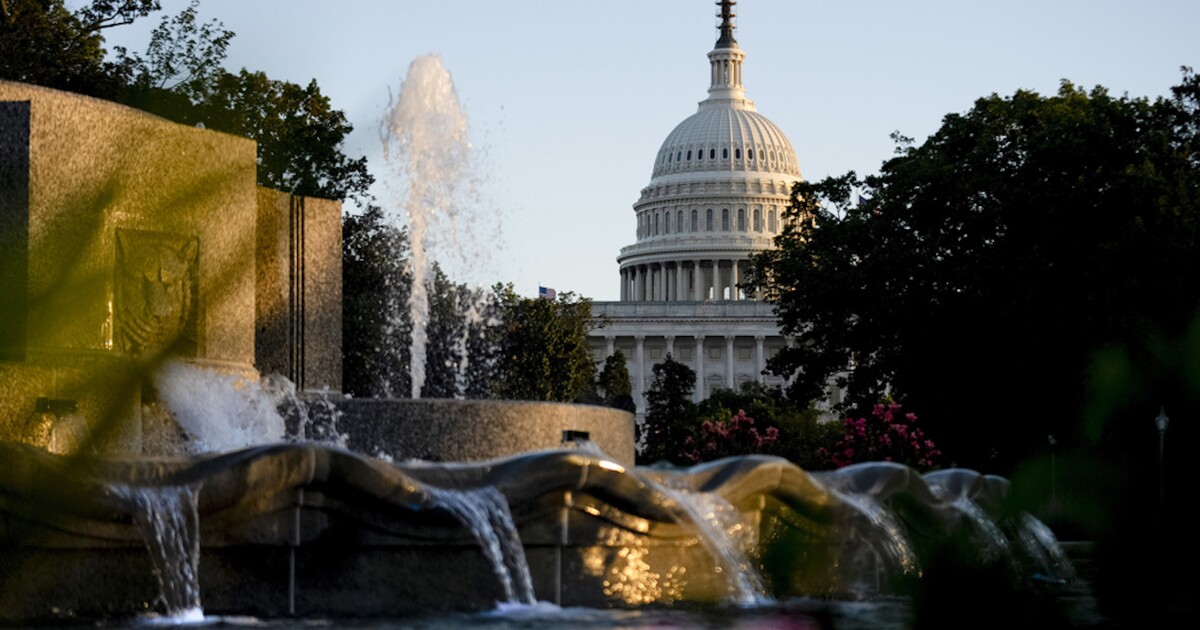

Republicans face an uphill climb to clinch retiring Sen. Debbie Stabenow’s (D-MI) seat next year.
Stabenow’s retirement provided an opening for Republicans in their larger quest for a Senate majority next year, which hinges on victories in purple and red states. Democrats control the Senate by a 51-49 margin. Republicans only have 10 incumbents up for reelection this cycle, while Democrats have 23.
BIDEN BEAT TRUMP ‘CHAOS’ IN 2020 — NOW NIKKI HALEY WANTS TO DO THE SAME
Still, a GOP victory is no guarantee for this vacant seat in Michigan, a state former President Donald Trump won in 2016 before going to President Joe Biden in 2020.
Democrats have Rep. Elissa Slotkin (D-MI) and progressive actor Hill Harper in their primary contest. Slotkin, a former CIA agent, is viewed as a competitive candidate because of her success in holding onto her swing district in the House for three consecutive cycles and her impressive fundraising network. Harper, known for his role on ABC’s The Good Doctor, is running to Slotkin’s left.
The Democratic Senatorial Campaign Committee, the Senate Democrats’ campaign arm, typically doesn’t get involved in primaries when not protecting incumbents. Regardless, Slotkin is viewed as the clear frontrunner in both the primary and general election, while the GOP is far from coalescing around a candidate.
“Anyone who is being honest will say that Elissa Slotkin is the presumptive Democrat nominee at this point,” Dennis Lennox, a Michigan GOP consultant, told the Washington Examiner in an interview. “Meanwhile, you have three or four Republicans fighting it out like kids at the little kids table until August, when they will be broke because they will have spent all their money winning the primary.”
The National Republican Senatorial Committee, the Senate GOP campaign arm, vowed in a statement at the time of Stabenow’s retirement to “aggressively target this seat in 2024.” They have, though it is not clear that they’ve achieved their desired result.
Nearly one year later, the Republican primary is a crowded one, with former Reps. Mike Rogers and Peter Meijer, former Detroit Police Chief James Craig, and businessman Sandy Pensler, who came in second in the state’s 2018 GOP Senate primary, in the race.
Rogers, who served in the House from 2001-2015 and chaired the House Intelligence Committee, has largely been out of the public eye since leaving office. He faced scrutiny as he was leaving public life from conservatives over his work on the Intel Committee’s bipartisan Benghazi commission, which absolved then-Secretary of State Hillary Clinton of any new responsibility in the 2012 attacks on U.S. facilities in Libya that killed four Americans including then-U.S. Ambassador to Libya J. Christopher Stevens. He also did a brief stint on CNN after leaving Congress, another point of contention for the party’s right flank.
Meijer is the great-grandson of the founder of the Meijer supermarket chain, a mainstay in Michigan that grew his family’s net worth to an estimated $6 billion. The 35-year-old’s main problem, similar to what brought him down in 2022, will be getting through another GOP primary after disavowing the former president. That lift will be even heavier in Michigan, where the state GOP party has fully embraced Trump since his 2016 win and remained loyal despite 2020 and 2022 losses.
Like Meijer, Pensler can self-fund his race. Still, his previous efforts doing exactly that, such as his 2018 Senate bid, failed to make him a top-tier candidate. His timeline for making a decision on a 2024 bid is unclear.
Craig had issues getting on the ballot when he ran against Michigan Gov. Gretchen Whitmer in 2022, and appears to have similar issues now.
Rogers had led the pack in terms of overall polling, plus he enjoys the support of the NRSC, though his ability to win the primary is no sure thing. The former congressman had toyed with the idea of throwing his hat in the ring since March when he concluded that a GOP presidential bid would likely be unsuccessful.
Where he struggles, as do the rest of the GOP candidates, is in general election polling against Slotkin, who has also dominated the contest in terms of fundraising. Slotkin had more than $5 million in the bank at the end of the third quarter of this year and has been consistently outraising her Democratic and GOP competitors. For comparison, Harper brought in just $1 million in the third quarter, while Slotkin brought in just under $3 million.
Rogers, who only launched his campaign with less than a month before the quarterly filing deadline, did raise an impressive $825,000 in that time, though it doesn’t compare to the war chest Slotkin has spent the year building.
Unlike Slotkin and Harper, who got in the race earlier this year and have been on the trail ever since, Rogers and his GOP competitors all held off on declaring their candidacies until recent months. Michigan operates with some of the latest down ballot primaries in the country, with the state not voting until next August on who will advance to the November general election.
“Michigan’s late primaries have always been a problem for us,” Saul Anuzis, the former chairman of the Michigan Republican Party, told the Washington Examiner. “I don’t think it benefits challengers. I don’t think it benefits the process in general to have such a late primary. “
CLICK HERE TO READ MORE FROM THE WASHINGTON EXAMINER
Despite that, Anuzis said the crowded field would actually help, not hurt, Republicans next year.
“I think the fact that there’s a lot of candidates in the race just basically shows the opportunities everybody thinks are available,” he explained. “It’s a good sign for Republicans to have multiple candidates running around the state talking to Republican activists, motivating the base, making their case to the people of Michigan.”





